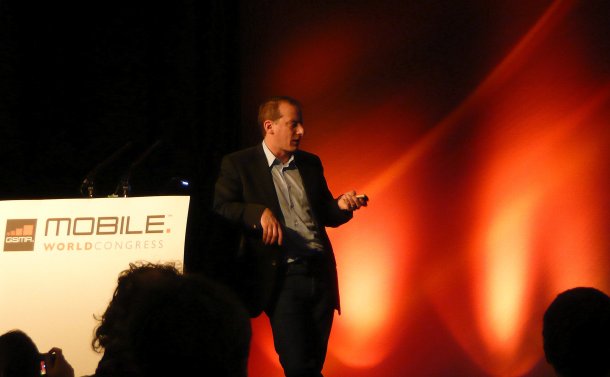The top mobile stories of 2009

From the SpinVox saga to a glimpse of the future, the mobile stories that made their mark
2009 has been the year of the smartphone with manufacturers lining up to shout about their shiny iPhone clones. These high-end mobiles defied the recession with sales up by almost a quarter compared to last year, even as sales of more common-or-garden mobile phones stalled, according to analyst Gartner.
The number of devices with Google's mobile OS Android inside was bolstered this year by new handset launches from Android pioneer HTC, including its flagship Hero handset, along with mobiles from the likes of Samsung and Motorola.
The latter's Droid, known as the Milestone in the UK, made waves across the pond with an ad campaign that directly dissed the iPhone - with the mantra: iDon't, Droid does.
Earlier in the year Android was also squaring up to the Symbian Foundation, the organisation behind the Symbian OS - which converted to open source last year.
At the Mobile World Congress (MWC) event in February, Symbian Foundation executive director Lee Williams claimed Android's 'openness' is a mere marketing label, pasted onto an OS he reckons is "controlled by Google".
Not to be outdone, Android co-founder and Google's VP of mobile, Rich Miner, sharpened his claws on the Foundation's philosophy - telling delegates: "If you need to join some sort of a club in order to get access to the source code... then it really truly isn't open." Miaow.

Android co-founder Rich Miner, speaking at Mobile World Congress in February 2009
(Photo credit: Natasha Lomas/silicon.com)
2009 also unearthed interesting mobile dilemmas for some BlackBerry users - how to get the handset out of the dog, for instance - in a report on how police officers are getting on with mobile data devices.
The story unearthed a lot of colour - from the pros and cons of introducing 3G mobile tech, to anecdotes about the sticky endings of some unlucky police BlackBerrys. As Keith Gough, mobile information manager for Thames Valley Police, phlegmatically put it: "Nothing is copper-proof. Police officers are not delicate flowers."
Elsewhere in 2009, Microsoft woke from its mobile slumber and started making noise again - with a big ad push around its rebranded 'Windows Phones' - smartphones sporting the latest iteration of its Windows Mobile OS, 6.5.
Microsoft's travails in mobile were the topic of an article which posed the question: Can Windows Mobile ever be sexy?. Gartner analyst Nick Jones had few words of comfort for the software giant, telling silicon.com: "It's getting towards the last throw of the dice for Microsoft."
Meanwhile big changes were afoot in the UK mobile industry as Apple terminated its exclusive contract with O2- allowing other networks to carry its hardware for the first time in two years.
Apple's mobile monogamy quickly turned to bigamy...
...as first Orange and then Vodafone announced they too would be getting a slice of Apple pie.
In the run up to Christmas, the 3G version of the handset is even available at Tesco - on a 12-month contract too. The times they are a-changing.
The iPhone 3G S may be turning heads in the consumer space but business users are still avoiding it, according to silicon.com's CIO Jury.
The panel of IT chiefs voted 10 to two against offering iPhones as part of their corporate device portfolio, citing reasons including battery life and fear of being too flashy for keeping Cupertino's mobile out of the enterprise. From everywhere except the CEO's office, that is, where iPhones, like fancy executive toys, are apparently right at home.
But what will the smartphones of the future look like? Expect the unexpected, according to another mobile story of the year: this photo feature looked at design concepts and prototypes from R&D labs across the world to explore what future devices might look like - from having changeable or wearable form factors to holographic or sensitive sides.
Our next mobile story of the year was a silicon.com exclusive: an article entitled High costs kill off London Underground mobile plans broke the news that a tender for a trial of mobile tech on the Tube had been quietly shelved.
Voicemail-to-text company SpinVox was also making the headlines following a BBC report suggesting the majority of messages it processed were done by call centre operatives, rather than speech recognition software. silicon.com reporter Natasha Lomas took a trip out to the Marlow HQ of SpinVox to see a demo of its software system in action.
Meanwhile, uncomfortable reading came in the form of a blog by futurist and silicon.com columnist Peter Cochrane on cameraphone phishers. Cochrane set out to investigate how much data can be gathered surreptitiously by snapping cameraphone pictures of laptop users' screens. How much data can be snaffled? Quite a lot, as it turns out. So next time you're doing a spot of work at the airport don't forget to check who's sitting behind you.
Last but by no means least, this year's crop of mobile big hitters would not be complete without the A to Z of Wireless - updated for 2009 to include a section on the history of the mobile phone, among other mobile goodness. Happy clicking!
silicon.com's top 10 mobile stories for 2009
- "Android is not open. It's a marketing label"
- It's a dog's life for police BlackBerrys
- Can Windows Mobile ever be sexy?
- iPhone coming to Orange as Apple ends its mobile monogamy
- iPhone has no place in business say CIOs
- Photos: Five mobiles of the future unveiled
- Exclusive: High costs kill off London Underground mobile plans
- Inside the SpinVox Brain
- Peter Cochrane's Blog: Beware the new phishers
- A to Z of Wireless